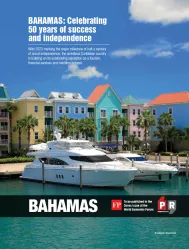Investors guided every step of the way by BIA
Driving attractive investment policies and operating from the Office of the Prime Minister, the BIA is a one-stop shop designed to simplify investing in the Bahamas

The BIA serves up the best investment support in sectors including hospitality.
The government’s proactive economic growth and development policies are guided by the Bahamas Investment Authority (BIA), which was formed to reduce bureaucracy for local and overseas investors. Phylicia Woods Hanna, the BIA’s Director of Investments discusses its work.
PR: Please provide a brief introduction on the work of the BIA.
PWH: We are a one stop shop, responsible for the promotion and the facilitation of FDI to our shores. Post-pandemic and in the pandemic, the inward flow of FDI has been sustainable. We have developed a strong promotion strategy geared towards our family of islands and the beauty of a 16-island destination.

PR: How are you developing investment opportunities, stimulating growth, and unlocking new sectors in the country?
PWH: We have developed research with BMOTIA in particular on their global missions. It’s a hand in hand effort — we have seen numerous collaborations and opportunities for other ministerial partnerships. The BIA is the nucleus for FDI in our country. We are responsible for making sure that investor is comfortable. It’s a service, so customer relations are key to us, processing applications and making sure questions are answered in a timely fashion and that the investor is comfortable bringing their capital to our country and they will get the best of their opportunity.
PR: What is BIA doing to effectuate the government’s vision?
PWH: The biggest change is removing as much of the red tape as possible through a new digital system. Communication with the public on what new systems are in place has been important. We have streamlined the process. The work is ongoing, and we are looking at the National Investment Policy and will be meeting with key stakeholders from the public and the private sectors to see how we can improve our policies and our legislations to facilitate FDI. We have opened the line of communications among agencies. The BIA is the nucleus to the government for FDI and so making sure all the government agencies that must participate in a particular project have effective communication to ensure the streamlined process is not only at our doorstep, but across agencies.
PR: What are some of the opportunities for partnerships and which key incentives can potential investors look forward to?
PWH: Manufacturing is one of the key areas we have identified for FDI. Food security has been a priority outlined by this administration, so agriculture is another key area. There are several concessions across agencies, the biggest being duty import duty of materials.
PR: What is the BIA’s role and strategy for fostering new and existing international partnerships for global growth?
PWH: Going to our partners, we’re not going to sit here in the Bahamas and wait but we’re going to go globally and make our rounds showing the markets that we have identified as key areas what the Bahamas has to offer beyond just the capital of New Providence but all the family islands, but the 16-island destination. That’s key for us.
PR: Your final message to the readers of Foreign Policy about choosing the Bahamas as their next business, holiday, and investment destination?
PWH: We are investor-friendly, business-friendly and always looking to improve the way we do business. The greatest beauty of our islands is that we are an archipelago; you get a different and unique experience with the Bahamas compared to our competitors because you can visit multiple islands on one trip.
Each island has a different culture we are very proud of and that we try to bring to the global market. Seeing is believing. When you come here, you can’t just visit one and be done. The Bahamas is a hidden treasure that I pray will be on the global stage in a meaningful way very soon.
Report Contents:

 Download the PDF
Download the PDF